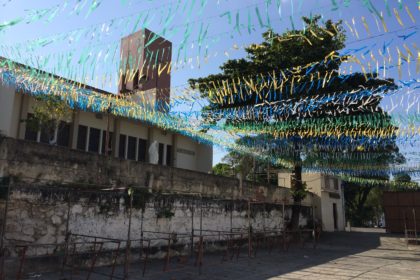
“A cop got shot last night, right here,” said our guide…
…as we got out of his car in front of Ação Social pela Música, an El Sistema nucleo in a Rio de Janeiro favela that has long been notorious for gang violence. “Right here” meant right in front of the Pentecostal Church where Ação Social takes place on the second floor. Heavily armed policemen were gathered in the streets around the building.
I am a North American middle-class woman of a certain age, and my fervent impulse was to climb immediately back into the car of our guide, Julio Camargo, and head down the hill to the studio apartment where we were staying in downtown Rio. But this option did not seem to occur to Julio, who is the pedagogy director of Ação Social. Nor did it seem to cross Eric’s mind. I found myself walking with them through the crowd of police officers – who were not sending any positive vibes in our direction, to put it mildly – and into the church and up the dark staircase.
We emerged on an upstairs balcony festooned with strings of tiny bright-colored flags, looking incongruously festive after the news we had just heard, and followed the sound of a string orchestra to a large rehearsal room where thirty or forty kids were playing – even more incongruously – a schmaltzy arrangement of “Love Me Tender.” The kids – some teenaged, some pre-teen – wore bright aqua tee shirts. They never took their eyes off their conductor, who seemed just a few years older than they were.
“Love Me Tender” was followed by “Somewhere Over the Rainbow” – which was followed by a samba with lots of complex rhythms. The kids switched effortlessly from schmaltz to sass. And then there was a medley called “The Strings Get to Know the Great Masters” – with snippets from Beethoven 9 and Tchaik 5. The switch from sass to symphonic seemed effortless too.
They stood up and took their bows as we applauded, and then they crowded together so we could snap a group photo. “This is our ‘B’ orchestra,” said the young conductor, Edvan Moraes. “At first, they couldn’t play ‘Love Me Tender’ at all. So we had them sit among the A orchestra, and play along with the A kids. And now the Bs can do it fine by themselves.”
The room had high ceilings and tall windows; a warm breeze blew through. We asked why the kids were not afraid to be here, even with the gang-and-cop violence surrounding them. “These kids have their own world here,” said Edvan, “it’s a haven for them, a place where they can grow. Some of our kids have been coming since they were so young that they were reading notes before they learned to read words!”
When the B Orchestra sat down again to resume their rehearsal, we asked if we could speak to them for a moment. With the translating help of Edvan and Julio, we told them how impressed and moved we were by their playing – they played so passionately and so well. We told them that in the U.S., programs like this are at the beginning stage, and there aren’t any ensembles that sound as good as they do. We asked them: “Do you have any advice for the U.S. kids that we can take back to them?”
The answers were immediate. “Tell them you can find something big here, something for your future!” said a cellist.
“Tell them that if you really work hard you can feel proud of yourself and your friends!” said a violist.
And from deep in the second violin section came this answer: “Bring us to them, to inspire them!”
When we said goodbye and left, the cops were still there on the street corner. I felt something like guilt – or at least acute awareness – about going back to the safety of our downtown flat and leaving those kids here in their favela, confronted daily with danger and privation. The best I can do is to honor their request in spirit – and bring them to you, to inspire you.
—Tricia